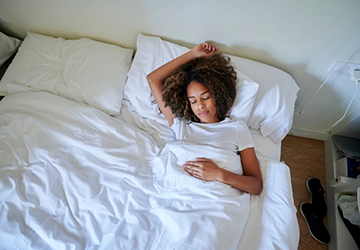How to Improve Your Sleep Quality for Better Overall Health
Healthy sleep patterns are critical to overall health. However, many people do not sleep well, leading to fatigue, irritability, and decreased productivity.
As important as sleep is, many people still need more of it. Many people struggle to get a good night's sleep due to many different factors. In this guide, we discuss some practical ways to improve your sleep quality. So, let's explore it!

9 Tips for Better Sleep
Sleep is essential to good health. If you can't maintain good sleep patterns, you could be at risk for various health problems, such as heart disease, stroke, diabetes, and mental health issues.
1. Minimize blue light exposure
to be honest! We all habitually use electronic devices before bed or in bed. To your surprise, all electronic devices are a significant source of blue light that disrupts your sleep-wake cycle. It mainly affects the production of melatonin. However, experts recommend avoiding electronic devices for at least an hour before bedtime. Using screen filters or apps that reduce blue light emissions, you can minimize exposure.
2. Avoid caffeine at night
Caffeine can affect your sleep quality. To promote better sleep, avoid caffeinated drinks or food after 8:00 pm. If you are used to drinking tea, you can drink herbal tea in the evening. Be aware that some medicines also contain caffeine. Therefore, please check labels carefully to avoid accidental ingestion.
3. Avoid napping
Naps can also affect the quality of your sleep. For example, a long or mid-afternoon rest may keep you awake. While short naps can boost your creativity and aid in the learning process, they can reduce the sleep you get at night.
However, only sleep for up to twenty to thirty minutes if you need to nap. This helps maintain a steady sleep routine, which regulates the body's internal clock.
4. Maintain a consistent routine
Healthy sleep is closely related to following a consistent sleep schedule. Be sure to keep it on, as it can significantly affect regulating our body's circadian rhythm. In this regard, deciding on sleep-promoting activities before bed can help.
5. Consider Supplementing with Melatonin
Melatonin is responsible for maintaining the sleep cycle. If its production is disturbed, you have a sleep disorder. Consider taking a melatonin supplement if you have trouble falling asleep or irregular sleep habits.
These supplements may benefit those who suffer from jet lag or work shifts. However, it is best to consult a doctor to ensure that other functions of your body are not affected.

6. Buy better beds and mattresses
Consider purchasing a comfortable mattress and supportive pillows that suit your preferences and promote proper spine alignment. Beds and mattresses can enhance comfort, minimize distractions, and reduce the risk of sleep-related problems such as back pain or discomfort.
Take the time to explore the different options and choose the bed and mattress that provide the best support and comfort for your body.
7. Create an environment that promotes sleep
Do you want to enjoy a healthy sleep? According to research, the environment plays an important role in sleep induction. You can force yourself to sleep by turning off the lights, using a night light, or listening to soothing bedtime music. This way, you can promote relaxation and help you fall asleep earlier.
8. Don't drink alcohol
Alcohol can make you tired and disrupt your sleep cycle over time. Alcohol consumption can lead to sleep fragmentation, increased frequency of awakenings, and decreased rest periods, which are critical for memory and optimal brain function.
Avoid alcohol before bedtime, and try to limit alcohol consumption in general. Instead, you can use healthier alternatives like herbal teas or warm milk.
9. Avoid Late Night Eating Habits
Overeating or eating large amounts before bed can disrupt sleep. Digestion requires energy and can cause discomfort, heartburn, and indigestion, making it difficult to fall asleep at the right time.
Avoid snacks or large meals at least two to three hours before bed. When you're hungry, choose a light, easy-to-digest snack, such as a small piece of fruit, yogurt, or a handful of nuts.
Package!
Restful sleep can significantly impact your overall daily life. By investing in better beds and mattresses, optimizing your sleeping environment, relaxing before bed, avoiding alcohol, and eating a healthy diet, you can create the ideal conditions for a good night's sleep. Remember, everyone's body works differently. So, it would help if you went through various ways to find the right solution.











